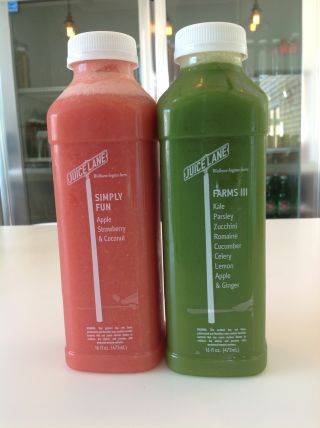Diet
What's Behind America's Current Juice Cleanse Craze?
The vogue for juice cleanses speaks volumes about our pollution anxieties
Posted August 13, 2013

Nearly everywhere you go, people have anxiety about what they eat and drink, and restrictions and beliefs that regulate how, what and when they ingest. Food laws are a cultural universal–but they vary widely from place to place. In Spain, for example, you may be told that drinking something cold on a hot day will make you sick by “unbalancing” the relationship between warm and cool in your body. But in America, the very opposite belief prevails: that cold drinks on hot days “re-hydrate” us and cool us down, helping us achieve a state of “balance.”
At a bar or bat mitzvah, I always enjoy re-reading the Abominations of Leviticus, one of the most clear-cut set of rules in our culture about what to eat, what to avoid and why. These laws have been followed by observant Jews for eons–sociologists and anthropologists generally agree that the Abominations originally functioned as a set of pragmatic health and safety precautions, but have now become a way of affirming one’s tribal affiliation. Ditto the Halal food laws observed by many Muslims worldwide today.
Among the tribe of privileged mothers I study and live among in the Hamptons and in Manhattan, there is a relatively new fascination with the powers and properties of various vegetable and fruit juices. At a recent event, I was surrounded by juicing enthusiasts who filled me in on the practice. Women, they told me (husband are generally juicing at the behest of their wives) often order specific combinations of juices to be delivered to their homes at the beginning of the week. They do this in order to perform a weekly ritual ablution called a “juice cleanse” for one, three, four or even five days, purging their bodies of toxins that accumulated over the weekend as they ate or drank with little restraint. Or they may substitute the juice for a single meal for several days in a row.
The Manhattan tribe favors juices that are cold-pressed and organic and locally sourced, thus maintaining a state of purity and authenticity. These juices can be very expensive and are often, but not always, delicious. After all, they are medicine. I think of them as the beverage version of the ubiquitious and very pretty white dresses that are the summer uniform of my tribe. The juices and the white dresses are immaculate and unsullied, suggesting a life that is at once privileged, simple and healthful.
From an anthropological perspective, the vogue for “juicing” speaks volumes about our pollution anxieties and our attempts to undo the effects of time and stress with these elixirs we imbue with magical powers and restorative properties.
The juicing trend started among a relatively small and very specific set–denizens of health food stores and raw foods enthusiasts and West Coast adherents of the colonic cleanse movement–and went mainsteam with Jamba Juice. However, the most popular juices among the tribe I study are a refinement of the mainstream version. Again, organic, cold pressed and nutrient-dense are key desirable qualities. If they are delivered to your doorstep, these juices arrive packed in dry ice, further reinforcing their status as precious and potent “gifts” from nature, packaged by knowledgable shamans. At a restaurant like Fresh in Bridgehampton, a greens juice can run you about $12. High end juices can also be found at the Juicy Naam in Sag Harbor. If you want a less expensive, stripped down version, try Provisions health foods store in Sag Harbor (where you will see another tribe entirely).
Juice Lane and Juice Press are wildly popular and masterfully concocted, with great attention to detail, quality and often, informed by the key elements of Eastern medicine. My young adult stepdaughter recently did a BluePrint Juice cleanse–another beloved and very expensive brand–and told me the belief among many is that such an undertaking not only purifies, but also improves digestion by giving the system a temporary break. My stepdaughter’s fiancé, a sports fan, points out the “juicing” also means taking steroids. Either way, “juice” = a magical potion that is believed to ward off decay and promote health, strength, beauty and vitality.
And one last thing: the Masai, nomadic pastoralists of Kenya, drink the blood of their cows and, less frequently, goats. They believe the blood provides perfect nutrition, keeping them--you guessed it-- healthy, beautiful and energetic.


